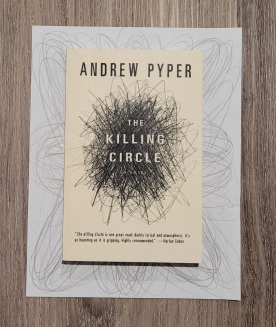Book Review: The Killing Circle by Andrew Pyper

Title: The Killing Circle
Author: Andrew Pyper
Release date: September 16th, 2008
‘A father and son used to live here.’
I first read this in April of 2020.
It was the last of Andrew’s books I hadn’t read and I held off on it because I was worried I might not like it, the synopsis teasing that this release was more in-line to be a crime-thriller than a supernatural read. Having read it twice now, the book IS more crime-thriller than anything else, a psychological-horror novel that races around the streets of Toronto and ultimately ending up in rural Ontario, but no matter the ‘genre’ labelling, you’d be hard pressed to find a creepier novel out there.
Also, the first time I read this one, I raced through it, completely captivated and desperately wanting to know what happened. The ending was a gut punch, so I decided to wait until doing a re-read of this one, until I felt the timing was right.
For this re-read, I took my time, savoring it, as though now I’m enjoying a glass of wine after having slammed the beer.
It also should be noted – for those two or three people in the world – that I’ve spent the last half dozen years pushing people (almost daily) to read Andrew’s work. I’ve essentially forced myself into the periphery of Andrew’s work, and (almost daily) get a DM/message from someone asking what book should they start with for reading his work or asking my thoughts on one of his books or his characters. I am no expert – and I’d even suggest others out there most likely know his work inside and out better than I – but I also don’t shy away from the fact that Andrew’s work has been paramount to my life – both as a reader and a writer (Hell, I just released a non-fiction book about just that!) and I’d like to think I do a decent job of getting others to discover his wonderful style of crafting a story.
And lastly, before I dive into the ‘review’ portion, I just want to note that 2008 is the fifteenth anniversary year of this novel being released. In May of this year, we celebrated the tenth anniversary of Andrew’s novel ‘The Demonologist’ releasing, and while it was that novel we focused on, ‘The Killing Circle’ is just as deserving as receiving celebration!
What I liked: At it’s basic level, ‘The Killing Circle’ can be described as a novel about a widower – TV critic Patrick Rush – who navigates life while raising his young son, Sam. Until one day, Patrick decides he finally wants to write the novel he’s always dreamed of writing and joins a writing group.
But, this is an Andrew Pyper novel, which means nothing is what it seems. And while this came out in 2008, you can lay comparisons of this novel with ‘Lost Girls,’ ‘The Homecoming,’ ‘The Only Child,’ and even ‘The Demonologist.’ The search for the truth. The realization that the truth was closer throughout the entire novel. And that sometimes a journey is needed to return everything as close to ‘normal’ as it can be.
As Rush continues to visit the writing circle, Pyper does a few neat things.
The first is the meta aspect.
Throughout, Andrew infuses this in the ‘real.’ Real places. Real world -isms. Characters based on real people (I can only assume Conrad is someone Andrew’s had dealings with in the past. Possibly Angela as well). And even the book itself. At first we follow how Rush becomes an instant-bestseller with ‘The Sandman,’ the story he stole from another writing circle member. But ‘The Killing Circle’ becomes a thing-within-the-thing as we learn (full-circle moment) the truth, the horrifying ‘why’ and the ‘what-next.’
Andrew even takes a swipe at Canada’s beloved Booker Awards, with Rush attending a pretend version of the event and eviscerating the usual attendees and even more common winners and celebratory authors. It can be seen as bitter, sure, especially considering an author of Andrew’s pedigree and bibliography having not been even nominated, or it can be seen as another sarcastic take on this ‘Toronto,’ Andrew’s ‘Toronto’ that is just like the real one, but shaded grey with the artistic license. It lends itself even more to the meta-ness of the entire novel.
Oddly enough, while this was written probably sixteen years ago – to be released fifteen years back – much of what Andrew describes about the city felt as though it was an observation from today. A city scorched by heat, humid as fuck, and how the buildings get taller, the rent gets higher and the mix of people coming and going makes for a reduction of knowing your neighbor.
In May, when I went to Toronto for the first time, my entire weekend. I was walking the streets of ‘The Killing Circle’ with the author who wrote ‘The Killing Circle,’ while surrounded by the buildings that keep getting taller and the rents getting higher.
The second aspect that Andrew does so well with this is the layers.
Patrick is a suspect. Patrick is a victim. Patrick is having to constantly look over his shoulder while also looking forward in fear of the Sandman. The members of the writing circle dip and dash within the story itself, ebbing and flowing to create a constant mix of chaos and anxiety. The story itself practically drips anxiousness from each page. We remain perplexed until the very, bitter end.
The third aspect that Andrew throws at us is the emotional aspect.
His son, Sam, loves him more than anything. As does Patrick to him. So, when the book opens with Sam being taken and Patrick desperately searching for him, Pyper throws us to the emotional wolves from the get go. From there, we get the news of Patrick’s wife, Tamara, dying young, of how his employment status changes and how, even up until Sam is taken, Patrick struggles with how to keep Sam safe, as new developments unfold.
Lastly, Andrew has a penchant for ‘non-typical’ endings. What I mean is – he’s a big five published author – an award-winning, and internationally lauded writer, yet not a single one of his novels end like you’d expect an author being published through these houses should end. We don’t get happy endings. We don’t get ‘everything-tied-up-in-a-neat-bow.’ When I read this the first time, I bawled my eyes out when it ended. Same thing here. Patrick’s story, ‘The Killing Circle’ novel, and the exploration of grief that Pyper infuses throughout this, come to an end and it left me devastated once again.
What I didn’t like: I think the only thing of note this time around, was that parts of the story may feel a bit dated – much like with ‘Lost Girls’ – in that it predates our current availability of technology. Patrick has to hoof it back and forth around the city to see if people are home, not able to fire off a text or DM. Patrick has to utilize the stacks to find clues about a characters real identity. It’s minor aspects, but is something that I pulls the story from the hear and now and firmly stamps a date on it.
Why you should buy this: The problem with having a favorite author who has released so many AMAZING novels, is that it becomes difficult to pick a favorite. When I first read this one, I declared it my favorite of his work. Now, having re-read it, I think it still remains there, but depending on the day (and the DM), other works from Andrew raise their hands up high to be chosen. ‘The Homecoming’ with its PNW fuckery. ‘The Only Child’ with its world-wide galivanting. ‘Lost Girls’ with its lady of the lake. ‘The Demonologist’ with its race against time and a demon. And ‘The Guardians’ with its small-town-coming-of-age-ghost-story brilliance.
It’s also odd to think ‘The Guardians’ came after ‘The Killing Circle.’ I was dumb-struck when I came across this passage in ‘The Killing Circle’ on my re-read.
‘People used to live in every empty house you’ve ever stood in, and this makes them no less empty.’
An inter-connection between these two novels, separated by three years of publication date. It reinforces my long held belief that all of Andrew’s works are thematically connected, that grief and journey are always at the forefront, always paramount to the ‘why’ of the characters we are introduced to and follow.
As for ‘The Killing Circle’ itself, if you’ve not read any of Andrew’s work and you’re looking for a not-so-horror-y-but-still-edge-of-the-seat-y read, look no further. This one races along, has plenty of twists and turns and ultimately leaves you gasping for air. A novel of the highest order.
5/5



